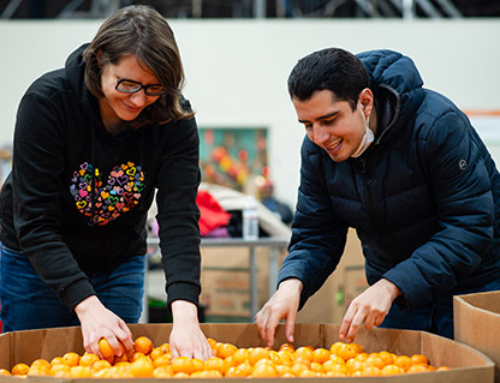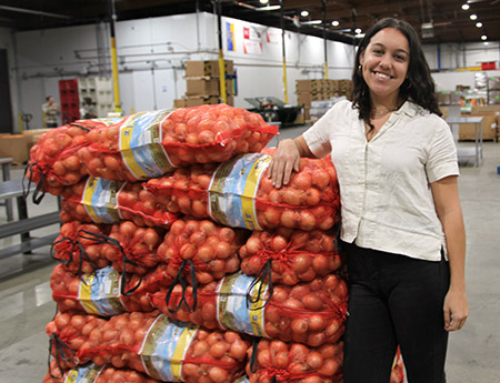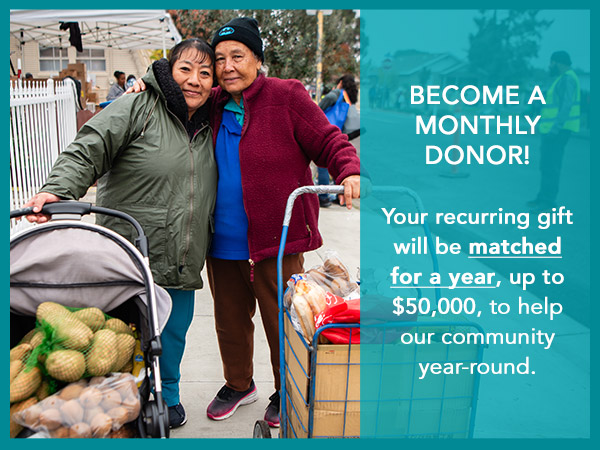By Ingrid Becker, Associate Director – Community Engagement
What a difference a trailer makes. That’s what Bob Whalen says as he hauls a gleaming silver and white carriage to roadside encampments in Berkeley.
Whalen is the food services manager at Dorothy Day House, our longtime partner agency. They serve people experiencing or at risk of homelessness. Using grant funds from ACCFB, they bought an 8-by-12 trailer last spring to create a mobile pantry.
“The real key for us is the flexibility it gives us,” Whalen says. “We can give services anywhere.”
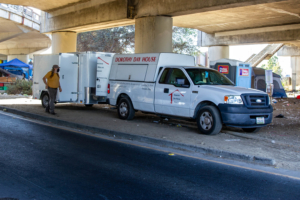
Bob Whalen, the Dorothy Day House food services manager, opens the mobile pantry door under a busy freeway.
Whalen and volunteers distribute groceries, socks, and other essentials three days a week to dozens of unhoused people in West Berkeley. The trailer has made outreach safer, especially with COVID.
“We’re minimizing one-on-one contact, it’s a lot cleaner, and it’s a lot more efficient,” he says.
Offering Support in Uncertain Times
For his first stop on a recent distribution, Whalen expertly maneuvers the trailer onto a patch of ground under Interstate 80. It’s quiet and Whalen wonders aloud if anyone is around. Making his way past tents, he announces the mobile pantry is open.
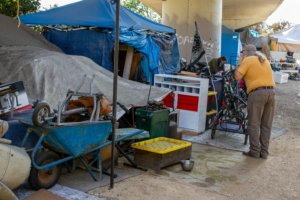
Bob walks around, letting people know the mobile pantry is ready for them.
About 10 minutes later, a few men and women walk over to the trailer and pick up canned chili and chicken, cereal, bread, and fresh fruit. Volunteers at Berkeley Food Network, another ACCFB partner agency, prepared the pantry bags.
A man named Rabbit grabs his groceries and thanks the volunteers before heading back to his tent, where he stows the food in a large cooler.
“I live on peanut butter,” he says. “Coffee helps every morning.”
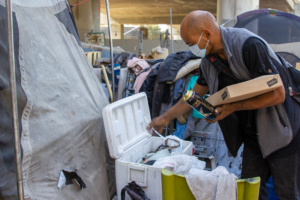
Rabbit opens a cooler outside his tent, where he stores some baked goods he picked up from the mobile pantry.
Pantry on Wheels Helps Build Trust
Dorothy Day House runs a downtown shelter and serves daily meals to thousands of Berkeley residents. The agency is part of a network of government and nonprofit providers bringing services to unhoused communities.
Whalen says the lack of shelter beds in Alameda County makes it hard to offer help to everyone who needs it. For now, the mobile pantry is a bridge.
“A big part of it is to build trust,” Whalen says. “It’s a lot easier to get people to accept services if we have a good relationship.”
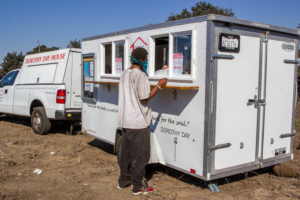
A man reviews the list of grocery items on the mobile pantry’s menu, including chili, vegetables, energy bars, and milk.
At another encampment near a freeway onramp, a woman named Adrienne chats with the mobile pantry volunteers and picks up a large bag of groceries. Adrienne works at a restaurant delivering meals and lives in her car with her boyfriend. She’s pregnant and says the food will help her family.
“I really appreciate the extra help when my food stamps run out because $10 a day isn’t enough,” Adrienne says. “Berkeley has a lot of extra help. Even when I least expect it.”



